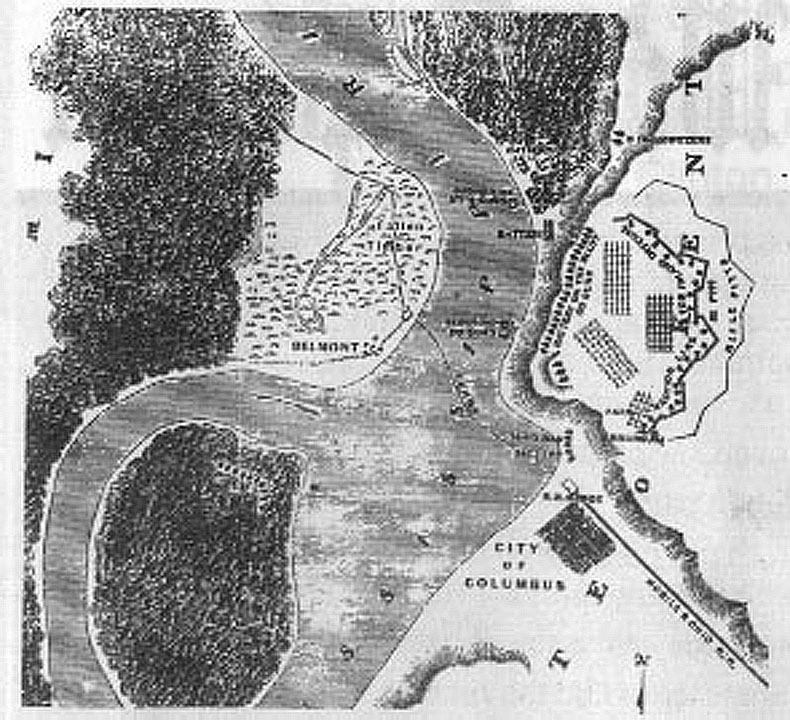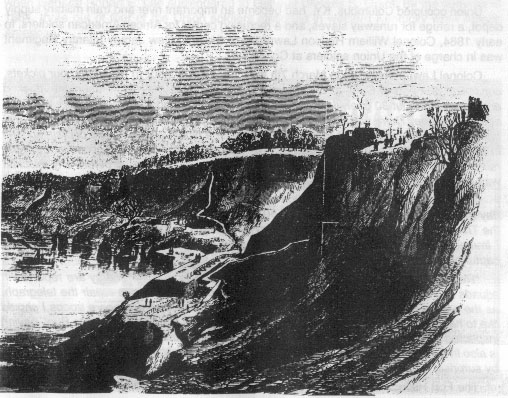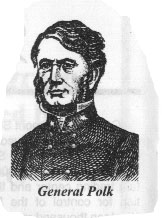 |
 |
|
| MAP OF COLUMBUS, KY. AND BELMONT, MO. - 1861 | SKETCH OF FORT DERUSSEY - 1861 | |
 |
|
|
| GENERAL LEONIDAS POLK | |
|
COLUMBUS-BELMONT STATE PARK
(Fort DeRussey)
GIBRALTAR OF THE WEST
by: DENISE BERRYHILL
Brother fought brother, father fought son, and neighbor fought neighbor. Such was reality in the War Between the States, the Civil War. And nowhere was this more true than in Western Kentucky and Northwest Tennessee.
In 1861 at the outbreak of the war, Kentucky was considered a neutral territory. Since Kentucky had not declared for either side and adamantly heralded it's neutrality, neither the North nor the South wanted to offend her citizens by being the first to cross into the state.
That changed, however, on September 4, 1861, when General Leonidas Polk of the Confederacy, responding to the Federals seizing a privately-owned boat, the "W.B. Terry, in Paducah, decided the time was right to make a stand in Kentucky. Knowing that Columbus held a strategic position on the Mississippi River, Polk ordered a fort to be built that would eventually hold 140 cannons. He also ordered a chain and anchor ( parts of which are currently on display at the park) stretched across the river to stop Yankee gunboats from coming down the river. Though this chain proved to be too heavy, for it broke and sank, this idea did show how determined Polk was to keep the North from encroaching on Southern territory.
On November 7, Generaal Ulysses S. Grant, commanding the Union forces at Cairo, came down the river and attacked Camp Johnston at Belmont, Missouri. Polk, across the river at Columbus, felt surrounded by the North and dug in for a battle. From the Kentucky side, Polk fired his guns at Grant's gunboats. Grant captured Camp Johnston and then set fire to the camp to destroy it. Grant, knowing it was impossible to hold the camp, decided to retreat to Cairo.
Polk was slow to send reinforcements to Camp Johnston because he thought it a Yankee ploy to overrun Fort DeRussey (now Columbus Park) from Paducah. When finally convinced the battle was across the river, Polk landed his troops between the Federals and their transports thereby causing another fight between the Yankees and the Rebels.
The North finally fought their way to their gunboats and with a storyline that could be taken from a romance novel, Grant was the last one up the gangplank. He then went to his cabin to lay down. But for a quirk of fate, what happened next could have made a difference in the outcome of the war.
Though tired and needing a rest, Grant, for no apparent reason, rose from his bed. Immediately, a stray bullet entered his window and struck the pillow where just seconds earlier his head had been laying.
Polk turned Columbus into the Gibraltar of the West, and Grant turned his attention to taking Fort Henry and Fort Donnelson in Tennessee. However, once these two forts were taken, Columbus was abandoned by the Confederacy fearing their supply lines would be cut. For the remainder of the war, Columbus was a Union stronghold.
 |
 |
|
| MAP OF COLUMBUS, KY. AND BELMONT, MO. - 1861 | SKETCH OF FORT DERUSSEY - 1861 | |
 |
|
|
| GENERAL LEONIDAS POLK | |
|